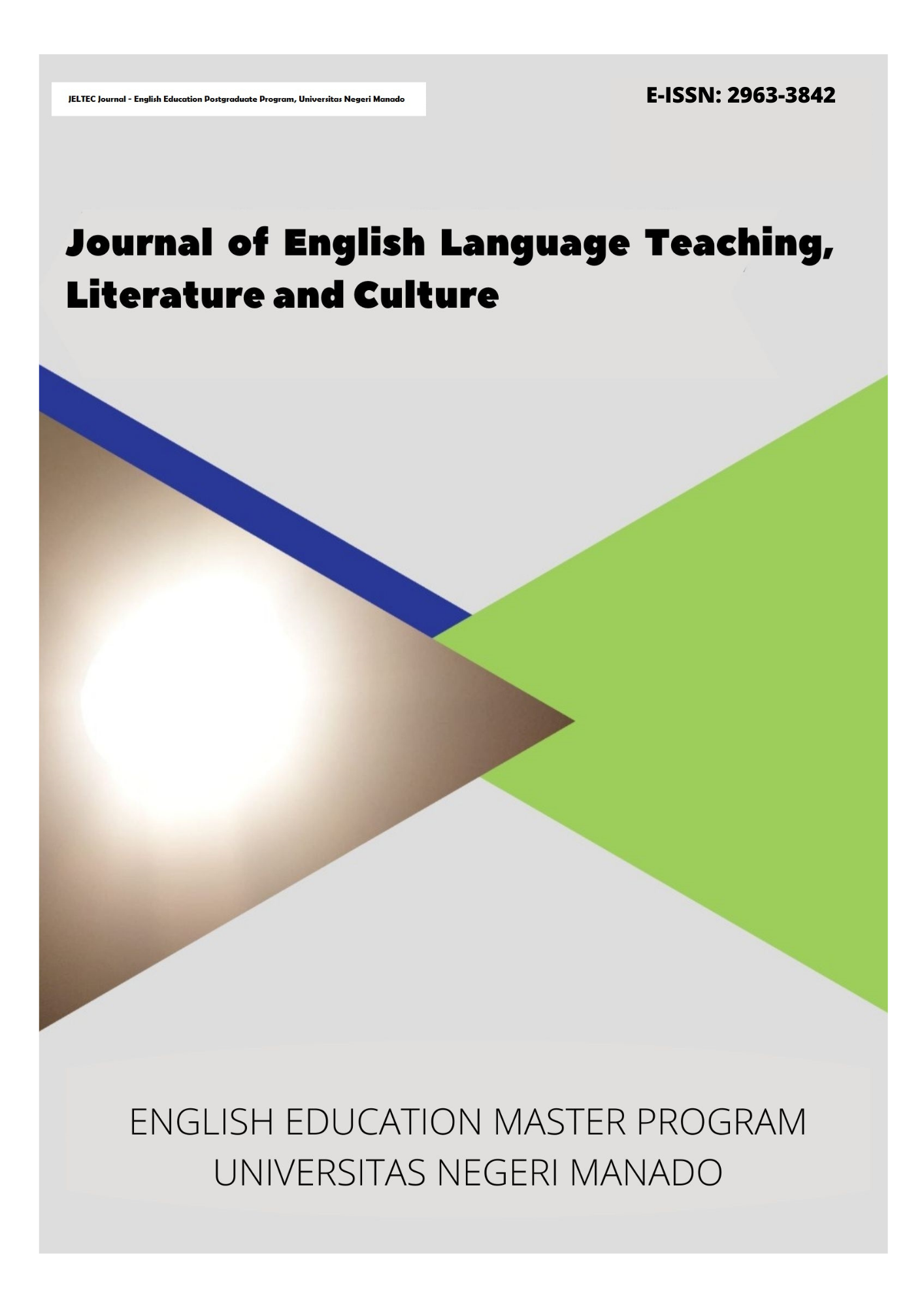Learning English Vocabulary Through the Duolingo Application to Help Young Learners Reading Skill
DOI:
https://doi.org/10.53682/jeltec.v1i1.3726Keywords:
Duolingo Application; Vocabulary; English; Young LearnerAbstract
This study aims at finding out whether the Duolingo application can be used in learning vocabulary to help young learners in their reading skills Mastery of English is something that is important nowadays To be able to master English it is necessary to master the components in it one of the components is vocabulary and vocabulary is also very helpful in English skills including reading skills In learning English vocabulary it will be easier if it is done from an early age or in a critical period In this modern world there are many ways that young learners can use to learn vocabulary one of which is using the Duolingo application Dulingo is an interesting app that makes it suitable for young learners At the end the results of this research will be seen < em>< p>
References
Adra S Doyran F 2017 Analysis of Young Learners And Teenagers Attitudes To English Language Learning International Journal of Curriculum and Instruction 9 2 179 197
Ajisoko P 2020 The Use of Duolingo Apps to Improve English Vocabulary Learning International Journal of Emerging Technologies in Learning iJET 15 7 149 155
Ali A S Deris F D 2019 Vocabulary Learning Through Duolingo Mobile Application: Teacher Acceptance Preferred Application Features and Problems International Journal of Recent Technology and Engineering IJRTE 8 79 85
Bai Z 2018 An Analysis of English Vocabulary Learning Strategies Journal of Language Teaching and Research 9 4 849 855
Bustillo J Rivera C Guzm n J Ramos L 2017 Benefits of using a mobile application in learning a foreign language Sistemas Telem tica 15 40 55 68
Chen K T C 2017 An Exploratory Study of NNES Graduate Students Reading Comprehension of English Journal Articles Reading in a Foreign Language 29 1 20 35
Dakhi S Fitria T N 2019 The Principles and the Teaching of English Vocabulary: A Review Journal of English Teaching 5 1 p 15 25
Delatu T A Wowor D J Kamagi S 2020 Increasing Students Vocabulary by Using Mind Mapping Technique at SMP N 2 Bitung E Clue Journal of English Culture Language Literature and Education 8 2 90 99
George M W 2008 The Elements of Library Research What Every Student Needs To Know New Jersey: Princeton University Press
Gereuw B Muntuuntu M Sanger M 2022 THE USE OF SONG TO INCREASE STUDENTS VOCABULARY AT SEVENTH GRADE OF SMP NEGERI 1 SIAU TIMUR SELATAN JoTELL : Journal of Teaching English Linguistics and Literature 1 1 144 156
Gu T 2017 The Effect of Vocabulary Knowledge on Chinese English Learners Reading Comprehension International Journal of English Linguistics 7 4 45 55
Guaqueta C A Castro Garces A Y 2018 The Use of Language Learning Apps as a Didactic Tool for EFL Vocabulary Building English Language Teaching 11 2 61 71
Irawan A Wilson A Sutrisno 2020 The Implementation of Duolingo Mobile Application in English Vocabulary Learning Scope: Journal of English Language Teaching 5 1 8 14
Jaelani A Sutari D R 2020 Students Perception of Using Duolingo Application as A Media In Learning Vocabulary Bogor English Student and Teacher BEST Conference [S l ] 2 40 47
Kandati S P Tatipang D P 2021 THE EFFECT OF VIRTUAL TEACHING ON ATTITUDES OF SECOND LANGUAGE ACQUISITION DURING COVID 19 CONDITIONS OF INDONESIAN STUDENTS Journal of English Culture Language Literature and Education 9 2 117 127
Lengkoan F Andries F A Tatipang D P 2022 A STUDY ON LISTENING PROBLEMS FACED BY STUDENTS OF HIGHER EDUCATION Globish: An English Indonesian Journal for English Education and Culture 11 1 41 50
Maru M G Tamowangkay F P Pelenkahu N Wuntu C 2022 Teachers perception toward the impact of platform used in online learning communication in the eastern Indonesia International Journal of Communication and Society 4 1 59 71
Matra S D 2020 Duolingo Applications as Vocabulary Learning Tools Journal of English Literature Linguistic and Education 1 1 46 52
Nushi M Eqbali M H 2017 Duolingo: A Mobile Application to Assist Second Language Learning App Review The Journal of Teaching English with Technology 17 1 89 98
Oktaviani A Fauzan A 2017 Teachers Perceptions about the Importance of English for Young Learners Linguistic English Education and Art LEEA Journal 1 1 1 15
Redjeki I S Muhajir R 2020 Duolingo for Grammar Learning Prosiding Lppm Uika Bogor [S L ]
Rorintulus O A Singal Y Batunan D A Mamentu C 2021 WRITING PROJECT IN EFL CLASS: FROM DESIGN TO RECOMMENDATION: A SYSTEMATIC REVIEW
Tatipang D Oroh E Z Liando N V 2021 THE APPLICATION OF MIND MAPPING TECHNIQUE TO INCREASE STUDENTS READING COMPREHENSION AT THE SEVENTH GRADE OF SMP KOMPETENSI: Jurnal Bahasa dan Seni 1 03 389 397






